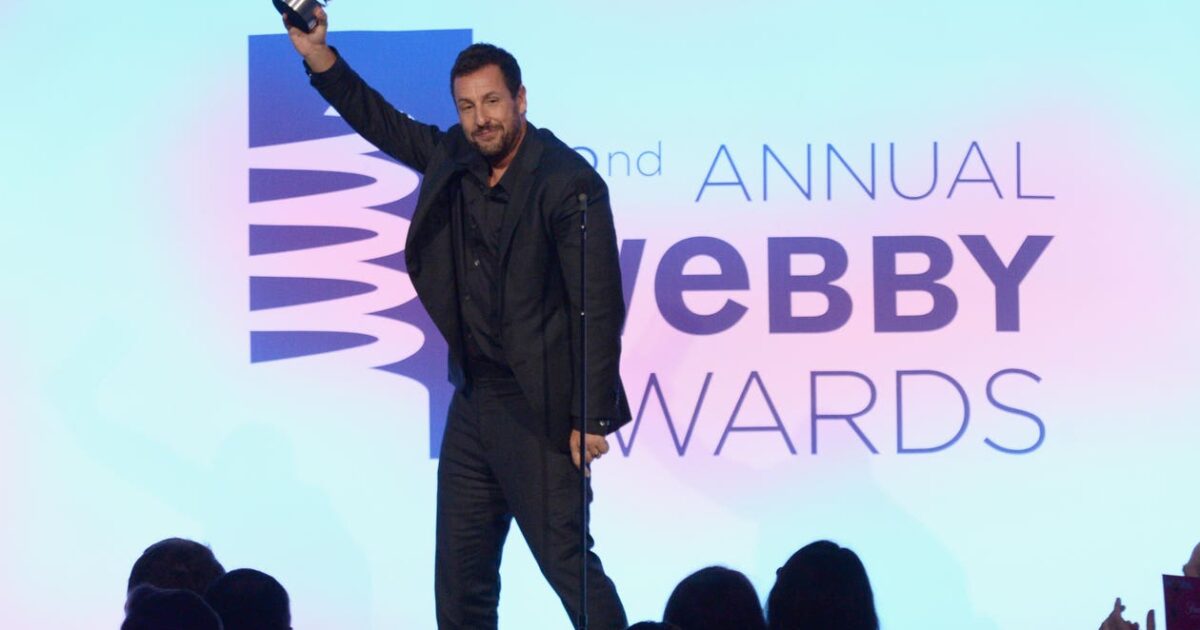The Webby Awards Just Gave Creators What They’ve Always Deserved

NEW YORK, NY – MAY 14: Actor Adam Sandler accepts award onstage at The 22nd Annual Webby Awards at … More
For nearly two decades, creators have been the unsung architects of internet culture. From the rise of YouTube vloggers in the 2000s to today’s multi-platform content entrepreneurs, creators have consistently driven innovation, conversation and now commerce online. Yet structurally, they remained undefined, often folded into broader categories like “social” or “video” in institutional settings. That changed in 2025.
This year, the Webby Awards introduced dedicated creator categories for the first time in its 29-year history. On the eve of the ceremony in New York, I spoke with Jesse Feister, the newly appointed Executive Director, about why this shift matters and what it means for the broader creator economy. “We’ve always recognized creators,” Feister told me. “But this year, we made the leap to define the format itself.”
Why Now? The Post-Pandemic Maturation of Creation
The catalyst for this recognition is not just popularity. It is evolution. Feister attributes the timing to the maturity of the creator format in a post-pandemic world. “The pandemic was a watershed moment. Creation and consumption scaled rapidly. And now that we’re a few years past it, the format has matured into something that we can actually define.”
That definition hinges on one key differentiator: in creator content, the individual is central to the work. “The person creating the content is core to what the audience is consuming and how they engage with it,” Feister said. This human-centered model distinguishes creator content from more generic or brand-led social media efforts.
In effect, creators are no longer just using the internet. They are shaping its grammar, logic and aesthetics.
Rethinking Excellence in the Creator Economy
By creating a dedicated structure for judging creators, the Webby Awards have taken a step toward institutionalizing what excellence looks like in this still-young industry. It is not just about views or followers. “Numbers are a signal,” Feister clarified. “But they’re not the full story.”
Instead, the judging process, which includes a 3,000-person academy of industry professionals, emphasizes creativity, innovation and connection. Subcategories like Best Short Form and Best Editing enable a more nuanced assessment of what makes creator content exceptional. This is crucial in an ecosystem where niche creators often punch far above their weight in impact, despite limited mainstream recognition.
As someone who works with creators professionally, I have seen this time and again. Creators with small audiences often drive immense loyalty, conversions or cultural moments because of the precision of their craft. This kind of excellence deserves frameworks that can recognize it.
From Amateur to Industry: Overcoming the Stigma
Despite their impact, creators are still often seen through an outdated lens. Many are viewed as amateurs or lucky anomalies rather than skilled, strategic professionals. As Feister noted, “People accept that creators are important. But I don’t think they take them seriously yet, not in the same way as traditional media or entertainment.”
This sentiment echoes something I have observed consistently. Creators are among the most underappreciated business operators today. The skills required such as storytelling, analytics, community building, media production and monetization, are rarely taught in schools or MBA programs, yet creators master them in real time, often independently.
The Webby Awards’ new category is a declaration of legitimacy.
The Creator-Fan Relationship: Lessons from Music
Interestingly, both Feister and I share roots in the music industry, which gives us perspective on how fandom evolves. As he put it, musicians have long built “worlds and brands around themselves,” and today’s creators are doing exactly that. “The creator builds a community, but that community takes on a life of its own. That’s what music fandom looked like. Now it’s happening at scale on the internet.”
From live performances to Discord servers, from album drops to TikTok trends, the mechanics of engagement have shifted. But the emotional resonance remains.
AI, “Brain Rot,” and the Absurdity of Now
One of the Webby’s strengths is its ability to tap into the pulse of the internet. Its annual trend report, which identified “brain rot”, now Oxford’s Word of the Year, months before it went mainstream, is a case in point.
Feister describes “brain rot” as a reaction to the absurd and overwhelming nature of modern digital life. “The only logical response sometimes is to do something ridiculous,” he said. Creators, more than anyone, understand this tension. They balance relevance with existential chaos, and creativity with monetization.
Add to this the rise of generative AI, and you get a content landscape that is both more accessible and more confounding than ever before. “AI will lower the barriers to creativity,” Feister said. “We’re going to lose some of what we loved, but gain a whole new wave of creators as a result.”
The Webby Awards: A Microcosm of Internet Culture
This year’s Webby ceremony, held May 12 at Cipriani Wall Street, reflects the broader creator landscape. It is chaotic, diverse and genre-defying. From Jake Shane and Caleb Simpson to Snoop Dogg and Dr. Fei-Fei Li, the stage will host everyone from Gen Z comedians to AI pioneers.
This mix underscores what the internet truly represents in 2025. It is a collision of creativity, technology, culture and identity. To be a creator today is to be at the center of that convergence.
Final Word: A Seat at the Table, At Last
For years, creators operated in the margins. They were wildly popular, yet structurally peripheral. With the introduction of creator-specific categories at the Webby Awards, they now have a seat at the table. More importantly, they have a table of their own.
Check out the full conversation with Jesse on my podcast The Business of Creators.
